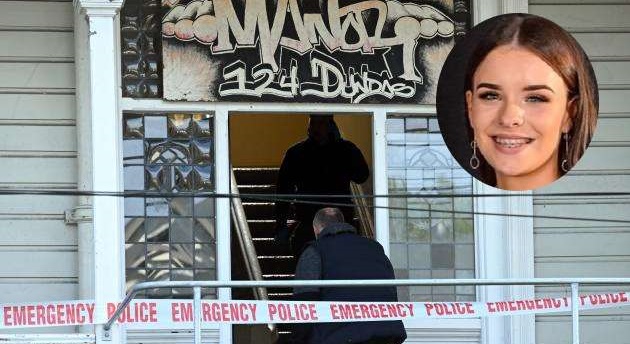The 19-year-old University of Otago student died in a stairwell pile-up in 2019 at a celebration dubbed "Maggot Fest" to which 400 people were invited via Facebook.

She found that the teen died on October 5 or 6, 2019 from crush asphyxia.
The inquest heard that at about midnight, partygoers at "The Manor" were "packed in like sardines".
An atmosphere of panic developed and about 40 people on the staircase, including Miss Crestani, were pulled into a pile-up which ultimately caused her death.
Since then, Sophia’s parents — Elspeth McMillan and Bede Crestani — have advocated for safe student behaviour in Dunedin, resulting in the creation of The Sophia Charter.

They did not put enough effort into keeping count of guests and ensuring those who did attend were safe, she said.
During the inquest, one tenant agreed they prioritised their belongings over the safety of partygoers.
"If the tenants as hosts had taken active oversight of their party, it might not have grown to the size it did, and the critical situation on the stairs might not have developed," the coroner found.
The tenants registered the party with the Good One Party Register and informed campus watch.
But there was nobody keeping track of who was entering the flat and witnesses estimated up to 500 attended."The [guest] list is only as effective as the extent to which it is enforced," the coroner said.
The party register website advised hosts to lock their bedroom doors to protect their belongings, which tenants at The Manor did.
They also attempted to prevent guests getting onto the balcony by boarding up doors, as this had previously caused safety concerns.
At the party there was only 85 square metre of floor space available, and a professor estimated if there were 35 people on the staircase, the density would be more than seven people per square metre.
The coroner found the tenants did not deliberately allow a dangerous situation to develop, and Sophia's death was not foreseeable without the benefit of hindsight.
"The tenants as hosts did not turn their mind to guest safety in a practical, on-the-night sense beyond barricading off the balcony and some monitoring of this," the coroner said.
She said the tenants could have allowed people into the closed off rooms to ease the crush, if they were aware of how overcrowded the flat was.
"Any guest phoning police if they had become aware of what was happening, might have led to it being controlled or shut down earlier, before it became a critical crush situation."
The coroner also found the landlord and property manager of The Manor could have intervened and prevented the party from ever occurring.
The residents had previously come to the attention of the university proctor and the Dunedin City Council over rowdy gatherings and she said the landlord or property manager should have considered terminating the tenancy, could have ensured they were directly informed of safety concerns and kept better records of conversations with the tenants.
"Had a better file been kept, patterns might have emerged with The Manor and resulted in closer attention or an application to the Tenancy Tribunal to terminate the lease," the coroner found.

Outside court, Sophia’s parents said it was difficult to hear that their daughter’s death was preventable.
"We are disappointed that the tenants did not acknowledge or take any responsibility for the role that their actions or lack of actions contributed to Sophia’s death, but rather had collective memory loss at the inquest," Ms McMillan said.
The coroner made multiple recommendations to prevent similar deaths but conceded they may be "naive".
She advised students hosting large parties notify relevant agencies prior, monitor the size and atmosphere of the event, and have at least one sober person available to seek help if needed.
The coroner also recommended that students leave parties if they feel unsafe.
She said the university should consider its approach to disciplining students following large events that breach the Code of Student Conduct, consider its approach to penalties imposed and publication of those.
The university should provide better information about the abilities and limitations of Campus Watch and offer training refreshers to its staff.
She also recommended the Good One Party Register website consider removing the advice to "lock your bedroom doors" when hosting a party - and that the register be reviewed to ensure it is working.
She called for more education from Otago University Student Association during orientation week about safe parties.
University of Otago vice-chancellor Grant Robertson extended his sympathy to Miss Crestani’s family and friends, and said the university would take time to carefully work through the recommendations in the report."We acknowledge the coroner’s comments about the Code, and the importance of on-going review of our work," Mr Robertson said.
The coroner acknowledged the circumstances that led to Miss Crestani’s death were not unique.
"The same outcome could have occurred at any large student party with the same features," she said.
Miss Crestani’s parents said their advocacy for a safe student drinking culture in Dunedin will not stop.
"We sort of talk of it as a semi-colon for us, we can now stop having to live over and over again the circumstances of Sophia's death and start to just remember the good times we had with her, but also put our energies back into The Sophia Charter," Ms McMillan said.











